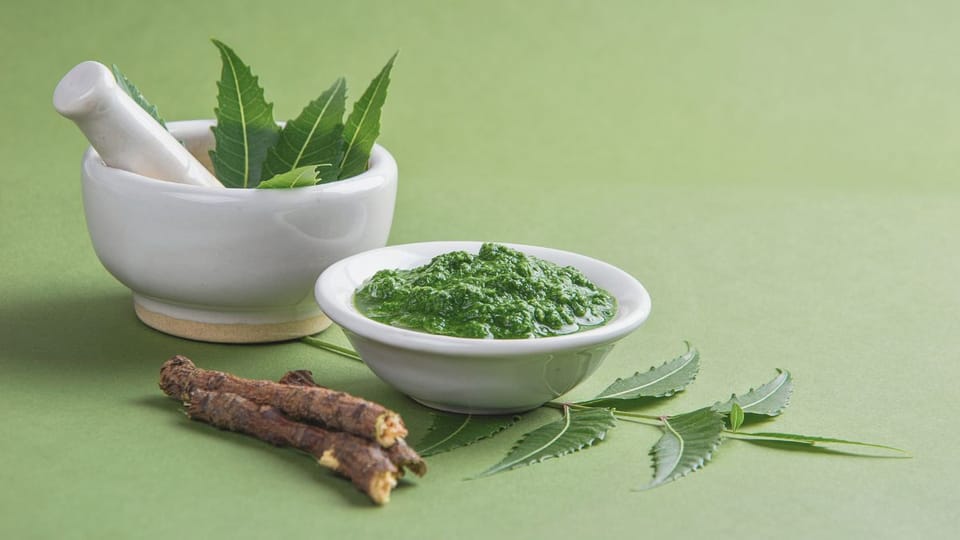Neem vs Synthetic Toothpaste: Which One is Better for Your Teeth?

Choosing the right toothpaste is crucial for maintaining good oral health. While synthetic toothpastes have been the norm for decades, there is a growing awareness about natural alternatives like neem-based toothpaste. Neem has been used in Ayurveda and traditional medicine for centuries due to its antibacterial, antifungal, and anti-inflammatory properties, making it an excellent choice for dental care.
This article compares neem-based toothpaste and synthetic toothpaste, analyzing their benefits, drawbacks, and overall impact on oral hygiene to help you make an informed decision.
What is Neem-Based Toothpaste?
Neem-based toothpaste is made using neem extracts, neem oil, or neem leaf powder, which naturally provide antibacterial and medicinal benefits. Neem is widely recognized for:
- Fighting harmful bacteria that cause plaque and cavities
- Preventing gum infections and inflammation
- Reducing bad breath
- Providing natural teeth whitening
Neem toothpaste is free from artificial chemicals, making it a safe and natural alternative to synthetic toothpaste.
What is Synthetic Toothpaste?
Synthetic toothpaste is commercially produced using chemical compounds that help in cleaning teeth, preventing cavities, and freshening breath. Some of the common ingredients in synthetic toothpaste include:
- Fluoride (for cavity protection)
- Triclosan (antibacterial agent)
- Artificial sweeteners (like saccharin)
- Sodium Lauryl Sulfate (SLS) (foaming agent)
- Preservatives and colorants
While synthetic toothpaste is effective in cleaning teeth, many of its chemical ingredients have raised concerns regarding long-term health effects.
Neem Toothpaste vs. Synthetic Toothpaste: Key Differences
| Feature | Neem-Based Toothpaste | Synthetic Toothpaste |
|---|---|---|
| Main Ingredients | Neem extracts, neem oil, natural herbs | Fluoride, SLS, triclosan, artificial flavors |
| Antibacterial Properties | Natural antibacterial and antifungal properties | Chemical-based antibacterial agents like triclosan |
| Protection Against Cavities | Prevents cavity formation naturally | Fluoride protects against cavities |
| Gum Health | Prevents gum inflammation and bleeding | May cause gum sensitivity in some people |
| Fresh Breath | Neem fights bad breath-causing bacteria naturally | Uses artificial mint and sweeteners for freshness |
| Chemical-Free | Yes, free from artificial chemicals | Contains chemicals like SLS, parabens, and preservatives |
| Side Effects | None, unless allergic to neem | Some chemicals may cause sensitivity or irritation |
| Eco-Friendliness | Biodegradable and natural | Chemical-based production, may contribute to pollution |
Benefits of Neem Toothpaste
1. Naturally Antibacterial and Antifungal
Neem contains powerful antimicrobial properties that help kill harmful bacteria in the mouth, preventing tooth decay, gum infections, and plaque buildup. Unlike synthetic toothpaste that uses triclosan, a chemical with potential health risks, neem fights bacteria naturally.
2. Strengthens Gums and Prevents Bleeding
Neem is anti-inflammatory, meaning it helps reduce gum swelling, irritation, and bleeding. People with sensitive gums or conditions like gingivitis benefit greatly from using neem-based toothpaste.
3. Prevents Bad Breath (Halitosis)
Bad breath is caused by bacteria and food particles stuck between the teeth. Neem toothpaste helps by:
- Eliminating odor-causing bacteria
- Detoxifying the mouth
- Providing a natural and long-lasting freshness
4. Safe and Chemical-Free
Unlike synthetic toothpaste that contains SLS, parabens, and artificial sweeteners, neem-based toothpaste is completely natural, making it safe for long-term use.
5. Helps Whiten Teeth Naturally
Neem toothpaste contains natural teeth-whitening agents that help remove stains without harsh bleaching chemicals.
6. Suitable for All Ages
Neem toothpaste is safe for children and adults, as it does not contain harmful chemicals like fluoride, which can be toxic if swallowed in large amounts.
Concerns with Synthetic Toothpaste
While synthetic toothpaste is widely used and offers effective cleaning, some concerns have been raised regarding its chemical content:
1. Fluoride Controversy
- Fluoride is known to prevent cavities, but excessive use can lead to fluorosis, which causes tooth discoloration and weakening.
- Some studies suggest that ingesting fluoride in large amounts may have negative effects on health, especially in children.
2. Sodium Lauryl Sulfate (SLS) Can Cause Irritation
- SLS is a foaming agent that creates lather in toothpaste, but it can cause mouth ulcers and gum irritation in sensitive individuals.
3. Triclosan and Other Chemicals May Have Health Risks
- Triclosan, an antibacterial agent in some toothpaste, has been linked to hormonal imbalances and antibiotic resistance.
- Artificial colors and flavors in toothpaste may contain toxic substances that are harmful in the long run.
Who Should Use Neem Toothpaste?
Neem-based toothpaste is ideal for:
- People with sensitive teeth and gums
- Individuals looking for a natural, chemical-free alternative
- Those prone to cavities and gum infections
- People suffering from bad breath (halitosis)
- Anyone who prefers Ayurvedic or herbal dental care
Who Should Use Synthetic Toothpaste?
Synthetic toothpaste may still be preferred by:
- People who specifically need fluoride-based cavity protection
- Those looking for a stronger minty flavor for fresh breath
- Individuals without sensitivity issues to chemicals like SLS
Which One is Better for Your Teeth?
Both neem toothpaste and synthetic toothpaste have their benefits, but neem toothpaste offers a natural, chemical-free, and effective alternative without the risk of harmful side effects.
Neem-Based Toothpaste is Better If:
You want a natural, chemical-free solution for oral health
You suffer from gum sensitivity or bad breath
You prefer Ayurvedic or herbal dental care
You want environmentally friendly oral hygiene products
Synthetic Toothpaste is Better If:
You prefer fluoride-based protection against cavities
You need stronger mint flavors for fresh breath
You don’t have issues with SLS or triclosan sensitivity
For those looking for a balance between modern science and nature, some brands now combine neem with fluoride in their toothpaste, offering the best of both worlds.
Neem-based toothpaste is a powerful and natural alternative to synthetic toothpaste, offering benefits like antibacterial protection, gum health improvement, and bad breath prevention—all without harmful chemicals. While synthetic toothpaste remains widely used, concerns about fluoride, SLS, and artificial additives make neem a safer and more holistic choice for many.
If you’re looking for a natural and effective way to maintain oral health, switching to neem toothpaste can be a step toward a healthier and more sustainable lifestyle.
This information is accurate as of 16/02/2024. Readers should check for any updates or scientific research before choosing an oral care product.

